Growing up in a Taiwanese family that emigrated to the US when he was 12-years-old, Barney Cheng (鄭伯昱) has a coming-of-age story that sounds awfully familiar. At family gatherings, well-intentioned, albeit nosy, relatives would always express concern that Cheng is single. “When can we go to your wedding banquet?” was a common refrain by some. “I know a great girl. I can arrange for you to meet her,” others would suggest.
Innocent comments, perhaps, except that Cheng is gay — a secret he only shared with his mother, who he told when he was in college.
Now living in West Hollywood, Los Angeles, home to one of the largest and most vibrant LGBTQ communities in the US, Cheng has just released his debut feature Baby Steps (滿月酒), a comedy-drama about a gay couple searching for a surrogate to have a baby. The movie, written, directed and starring Cheng, is inspired by his experiences as a gay man, and centers on a mother who struggles to come to terms with her son’s sexuality and his non-traditional lifestyle.

Photo Courtesy of Hualien Media
Shot in Taipei and Los Angeles, Cheng’s debut feature is also a Taiwanese-American co-production backed by impressively strong talent on the production side. This includes the UK’s Stephen Israel and Taiwan’s Hsu Li-kong (徐立功), noted for producing Ang Lee’s (李安) Father Knows Best trilogy, including The Wedding Banquet (囍宴, 1993), and the martial-art classic Crouching Tiger, Hidden Dragon (臥虎藏龍, 2000).
Cheng, 44, says it has been a long journey getting to where he is now.
HOLLYWOOD EXPERIENCE
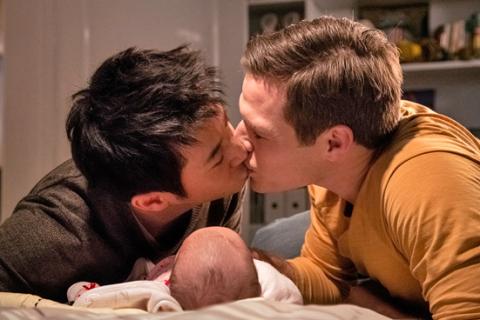
Photo Courtesy of Hualien Media
Like any Taiwanese who wants to make their parents proud, the young Cheng did well in school, and was admitted to Stanford University. However, ever since he was a little boy, the straight-A student had always wanted to act.
“I didn’t know if pursuing theater and the arts was possible. So I chose the traditional route of study, thinking maybe I go to the law school and become a lawyer. My mom would have been so happy,” the filmmaker recalls.
Chang’s professional interest in acting was kindled following a one-year program at Oxford University that turned into outings in London every night to see stage performances. After graduation, Cheng began to pursue a career as an actor in New York, working in theater, television, movies and commercials. His break came in 2002 when he got a part in Woody Allen’s Hollywood Ending. The experience not only brought Cheng plenty of attention and more working opportunities, but also became an important source of inspiration.
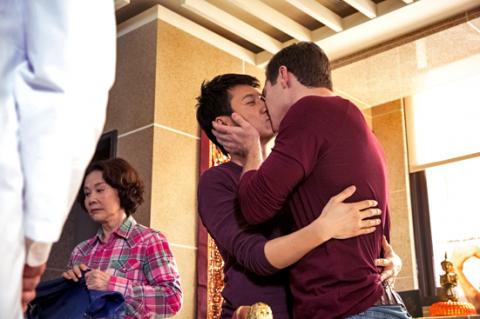
Photo Courtesy of Hualien Media
“When Woody worked as a stand-up comedian, he created projects for himself. He writes his own movies, directs them and sometimes acts in them… He inspires me to tell my own stories, to create opportunities for myself,” he says.
‘COLOR-BLIND’ CASTING
As a well-educated and fully integrated Asian-American, Cheng says that he has more opportunities than his Caucasian counterparts, as Hollywood is emphasizing the practice of non-traditional, or color-blind, casting, which means casting a role without taking into consideration the actor’s ethnicity.
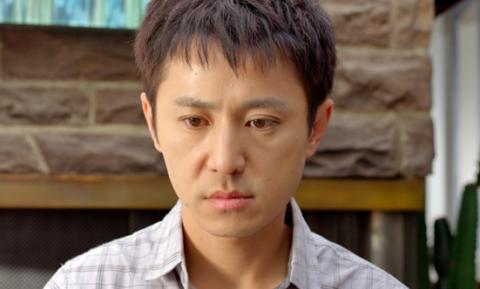
Photo Courtesy of Hualien Media
“If there is a role, say a doctor or a nurse, it can be Asian, Black or Hispanic. Every actor has equal opportunity to audition for that role… But let’s say a TV project talks about an Asian family, a Caucasian can’t play those parts,” Cheng says.
Similarly, as characters of different cultures and ethnicities become the norm, gay characters have become so common in Hollywood that it is not considered a gay character anymore.
“Gay characters are in TV all the time. It is just a character now. [It is] just like now there are more and more Asian-Americans. We are just a person. We are a doctor, a nurse. We are not a Taiwanese doctor or Chinese doctor,” he says.
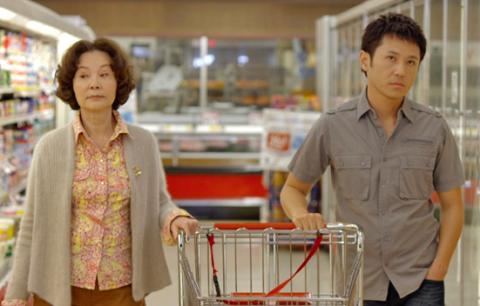
Photo Courtesy of Hualien Media
MOTHER AND SON
For Cheng’s feature debut, in which he plays the gay son trying to form a family with his partner, Taiwan’s veteran actress Grace Kuei (歸亞蕾) played an essential role as the mother both in the movie and real life. Impressed by Kuei’s performance as the mother in Lee’s 1993 The Wedding Banquet, a family-drama about a gay Taiwanese-American man who marries a woman to please his parents, Cheng thought Kuei would be right for the mother role.
Surprisingly, not only did Kuei agree, but she quickly formed a close working relationship with Cheng by helping him to develop the story and characters. Kuei spent time with Cheng’s mother, trying to understand how she has come to terms with her son’s being gay — from her initial shock, to acceptance to becoming proud of who he is.
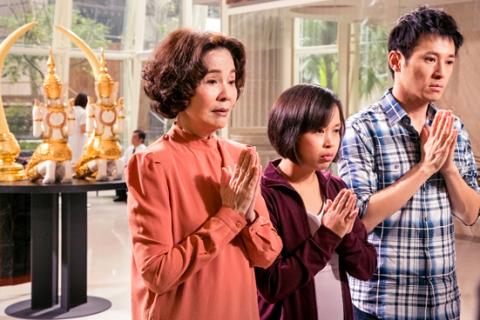
Photo Courtesy of Hualien Media
A solid friendship grew between Cheng and Kuei, who have developed a “mother and son” relationship, he says.
“The first draft emphasized the gay couple, and it slowly evolves to become a mother’s journey because of Grace,” Cheng says.
“The soul of the movie is really the mother. How she comes to accept this new family her son and her son’s partner want to establish. It is about her eventually accepting and embracing that new family,” he adds.
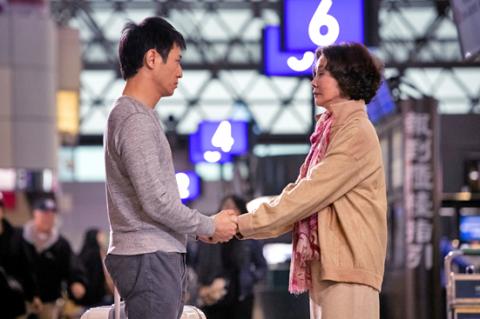
Photo Courtesy of Hualien Media
GAINING VISIBILITY
But the making of the film was hardly a smooth ride.
While the money was easily available on the American side, Cheng had troubles finding Taiwanese investors. For a long time, they couldn’t get the money together, apart from a few million NT dollar grants from the Ministry of Culture and the Taipei City Government’s Department of Cultural Affairs.
Just when Cheng was about to give up the project, Kuei came to his rescue. She picked up the phone and called her old friend Hsu. Soon Cheng flew to Taipei to meet the producer. Two months later, he was in Taipei, shooting the movie.
Cheng says the delay turned out to be a blessing.
“Had we made the movie two years before, the story and characters wouldn’t be as rich because Grace and I had been developing the story all the time.”
Baby Steps had its world premiere in Taiwan on Mother’s Day earlier this month.
“This movie is not just a gay movie. I think we have crossed over. It is a mainstream movie. We all have moms, papas and parents, and we can relate to the relationship.”
Meanwhile, Cheng also hopes that the movie can help bring visibility to Taiwan’s LGBTQ community.
And what was his mother’s reaction after seeing the film?
“She was so happy and so proud. Her friends have also seen it, and they were so touched. My mother was very happy that her friends loved the movie,” he says.
Baby Steps will start showing in the US through the film festival circuit next month. The first stop: San Francisco International LGBTQ Film Festival.

One of the biggest sore spots in Taiwan’s historical friendship with the US came in 1979 when US president Jimmy Carter broke off formal diplomatic relations with Taiwan’s Republic of China (ROC) government so that the US could establish relations with the People’s Republic of China (PRC). Taiwan’s derecognition came purely at China’s insistence, and the US took the deal. Retired American diplomat John Tkacik, who for almost decade surrounding that schism, from 1974 to 1982, worked in embassies in Taipei and Beijing and at the Taiwan Desk in Washington DC, recently argued in the Taipei Times that “President Carter’s derecognition

This year will go down in the history books. Taiwan faces enormous turmoil and uncertainty in the coming months. Which political parties are in a good position to handle big changes? All of the main parties are beset with challenges. Taking stock, this column examined the Taiwan People’s Party (TPP) (“Huang Kuo-chang’s choking the life out of the TPP,” May 28, page 12), the Democratic Progressive Party (DPP) (“Challenges amid choppy waters for the DPP,” June 14, page 12) and the Chinese Nationalist Party (KMT) (“KMT struggles to seize opportunities as ‘interesting times’ loom,” June 20, page 11). Times like these can

June 23 to June 29 After capturing the walled city of Hsinchu on June 22, 1895, the Japanese hoped to quickly push south and seize control of Taiwan’s entire west coast — but their advance was stalled for more than a month. Not only did local Hakka fighters continue to cause them headaches, resistance forces even attempted to retake the city three times. “We had planned to occupy Anping (Tainan) and Takao (Kaohsiung) as soon as possible, but ever since we took Hsinchu, nearby bandits proclaiming to be ‘righteous people’ (義民) have been destroying train tracks and electrical cables, and gathering in villages

Dr. Y. Tony Yang, Associate Dean of Health Policy and Population Science at George Washington University, argued last week in a piece for the Taipei Times about former president Ma Ying-jeou (馬英九) leading a student delegation to the People’s Republic of China (PRC) that, “The real question is not whether Ma’s visit helps or hurts Taiwan — it is why Taiwan lacks a sophisticated, multi-track approach to one of the most complex geopolitical relationships in the world” (“Ma’s Visit, DPP’s Blind Spot,” June 18, page 8). Yang contends that the Democratic Progressive Party (DPP) has a blind spot: “By treating any